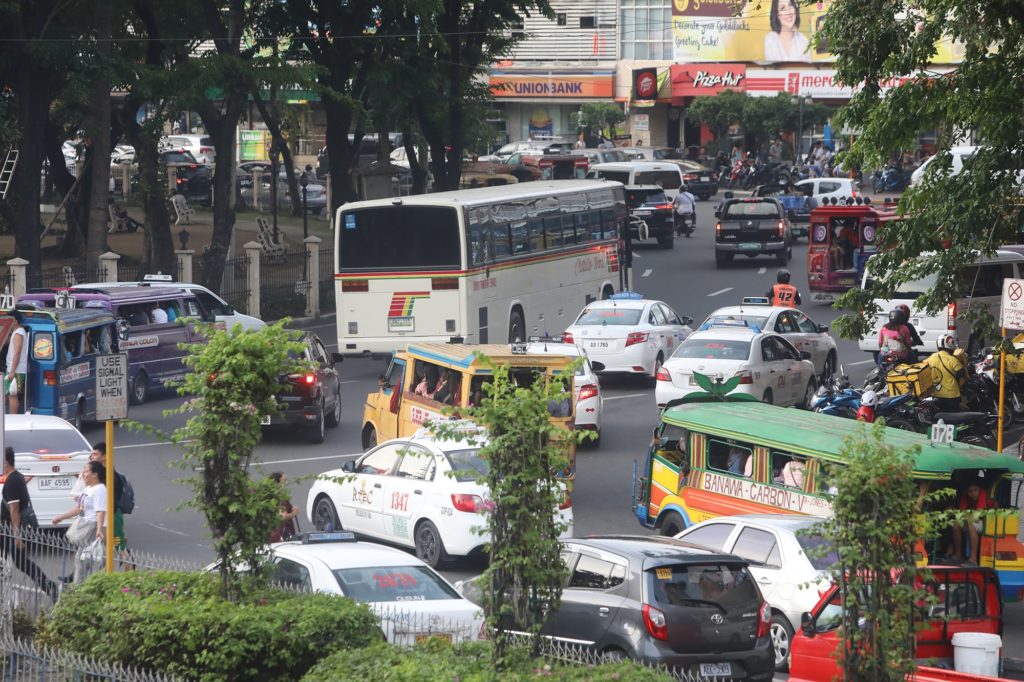
This road section along Fuente Osmeña Rotonda is one of Cebu City’s busiest during rush hours, as shown in this photo taken on July 18, 2018, and has been proposed to be a key hub for the now stalled Bus Rapid Transit (BRT) project.
The fate of the P17-billion Cebu Bus Rapid Transit (BRT) hits another snag after the Department of Transportation (DOTr) announced its intention to, once again, put on hold the implementation of the three BRT systems in the country.
But at the same time, the DOTr assured that the Cebu BRT project was not completely scrapped as it remained in the “basket of solutions” that Transportation Secretary Arthur Tugade has promised to consider in order to address the growing traffic problem in Metro Cebu.
In a press conference in Clark, Pampanga, on Tuesday, Tugade said the BRT projects in Metro Manila (the Quezon Avenue BRT Line and Edsa BRT Line) and in Cebu would be deferred pending further study.
With this development, Cebu City officials appealed to DOTr to clarify the decision, especially that the city government has already identified and has planned to relocate around 80 families in Barangays Sambag I and Mambaling who would be affected by the BRT route system.
“We have to ask for a clarification on what they really mean,” said City Administrator Nigel Paul Villarete.
“It was on one single news report which states that the BRTs are put on hold but on the same news report, the BRT is included in the basket of solutions. I think, the way I read it, they (DOTr officials) were asked about the Manila BRTs and Undersecretary (Tim) Orbos clarified that the Cebu BRT is still part of the ‘basket of solutions,’” he added.
Villarete also noted that the DOTr, the lead implementing agency of the BRTs, has not formally notified the city government, who will benefit from the Cebu BRT, on their decision to defer the project.
He added they were also waiting for any directive coming from the National Economic and Development Authority Investment Coordinating Committee (Neda–ICC) on whether or not the project would still proceed.
“There will be an ICC meeting by the end of the month so (the outcome of the meeting) will be the official pronouncement because we have to understand that there was a request of cancellation by the DOTr last April,” Villarete explained.
Even before Tuesday’s announcement, Tugade had expressed disinterest in the project, saying the BRT systems would worsen traffic on already congested city roads,
which is the same position taken by Presidential Assistant for the Visayas (OPAV) Secretary Michael Dino, who has been opposing the BRT.
Tugade wrote a three-page letter addressed to Finance Secretary Carlos Dominguez III, chairperson of the Neda-ICC, to cancel the Cebu BRT last April 11.
But the Neda-ICC requested the DOTr to submit not only a quantitative analysis to support their claims that implementing the BRT with narrow roads will be irrelevant but also a short-term alternative for the project.
The BRT project envisions a dedicated lane for specialized buses and stations. It is one of the traffic solutions included in the Duterte government’s “Build, Build, Build” program.
The DOTr, however, has argued that the project actually posed logistical nightmares given the number of available lanes and road infrastructure in Cebu City.
Initially identified as one of 75 high-impact government projects in 2016, the proposal to build BRT lines hit a snag after Tugade said he was not inclined to approve it.
With the multiple delays the BRT projects faced, the Commission on Audit (COA) has flagged them as among the projects under DOTr’s responsibility that were “funded but not implemented or only partially accomplished.”
State auditors pointed out that most of the DOTr’s delayed or failed projects were due to “frequent changes in policy directions by political leaders and economic managers.”
Basket of solutions
As for the BRT-Cebu system, DOTr Undersecretary Tim Orbos said it was still included in the DOTr’s “basket of solutions” for Metro Cebu’s traffic congestion that would soon be outlined in a letter to the Department of Finance (DOF) and Neda.
Although Orbos did not elaborate to reporters in Metro Manila the other solutions that comprised the ‘basket of solutions,’ it could be recalled that these were discussed last July 2 in Cebu City when the OPAV unveiled DOTr’s Integrated Inter Modal Transport System (IITS).
Dino described the IITS as a “basket of solutions” to the traffic problem and mass transport needs in Metro Cebu, and added that it was the product of Tugade’s roadside inspection of the 23-kilometer route of the BRT last May.
Aside from having a BRT in roads with at least three lanes, the IITS also included a point-to-point (P2P) bus system, a monorail system for Mactan Island, and a Light Rail Transit (LRT) that would cover from Carcar City in the south to Danao City in the north.
Relocation
Meanwhile, Francisco Fernandez, executive assistant of Cebu City Mayor Tomas Osmeña, said they sent their plans on relocating the affected families to the World Bank (WB) last June.
He said they were now waiting for the response from WB, which in 2014 has entered a $141-million loan agreement with the Philippine government to fund the BRT Cebu project.
“These families are those whom we classified as informal settlers. We’re eyeing to relocate them in Barangay Lorega San Miguel, and build there a five-storey building for them to occupy. There will be compensation on their loss of income. But we’re waiting for the approval of the WB,” said Fernandez.